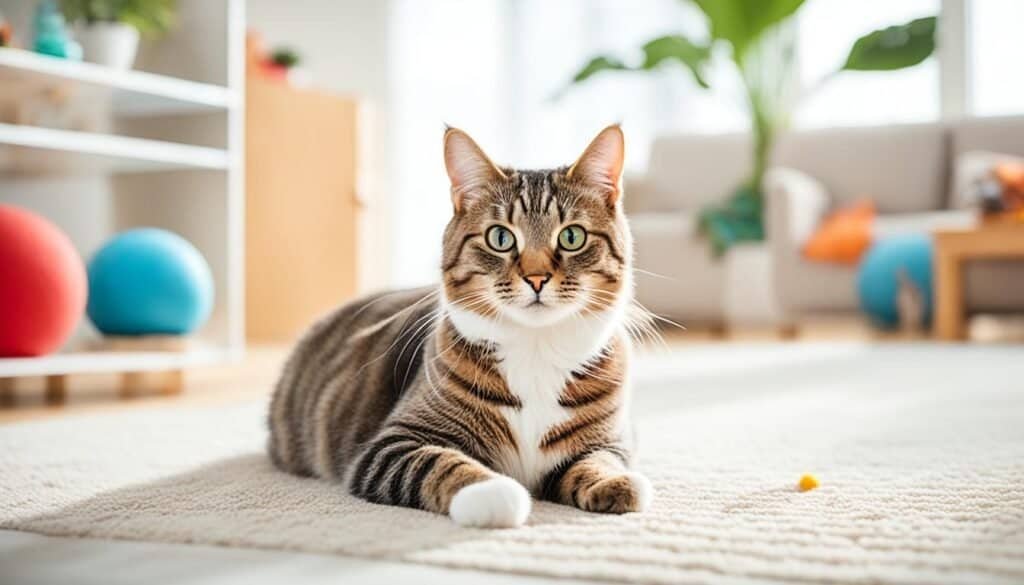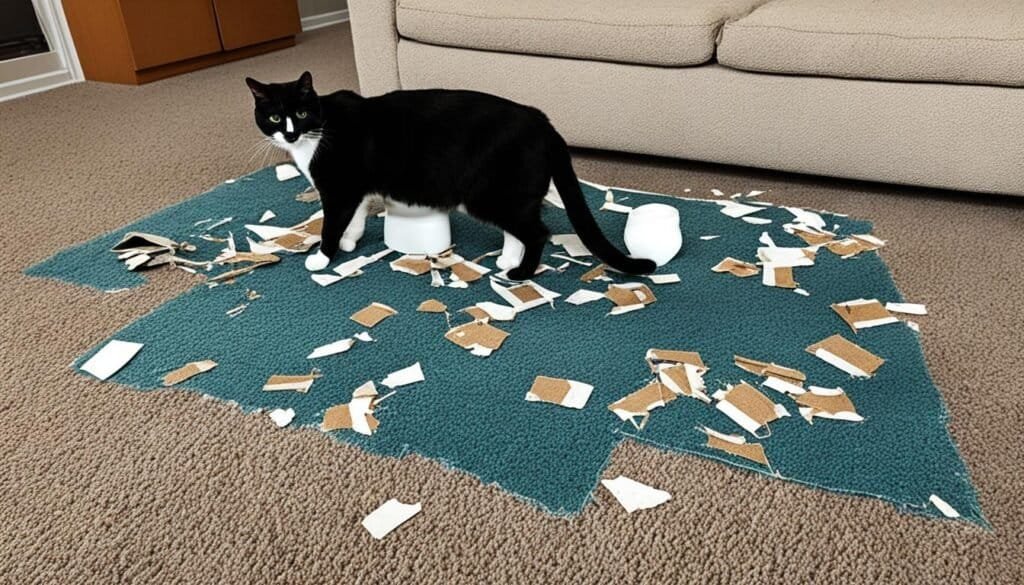In the Philippines, owning a cat comes with certain legal considerations and responsibilities. Understanding the pet ownership laws and cat ownership rights is crucial for cat owners to ensure compliance and the well-being of their feline companions.
There are rules and regulations in the Philippines that outline cat legal considerations for your feline companions. From ownership guidelines to ensuring their well-being, it’s all there to make sure cats are taken care of properly.
Whether you’re in a bustling city like Manila or a more relaxed setting in Cebu, these rules are designed to ensure that cats are treated with respect and care. We’re going to discuss the basics, covering things like ownership responsibilities and general welfare, without overcomplicating it.
Key Takeaways:
- Being aware of the legal responsibilities of cat ownership in the Philippines is vital for every cat owner.
- Pet ownership laws and cat ownership rights are in place to protect the welfare of cats and ensure responsible ownership.
- The Animal Welfare Act of 1998 prohibits acts of cruelty towards animals, including cats, and imposes penalties for violations.
- Responsible cat ownership involves vaccinating, registering, and providing proper care for cats.
- Cat owners may be held liable for any damages caused by their cats, emphasizing the importance of preventing incidents and ensuring public safety.
The Animal Welfare Act of 1998
The Animal Welfare Act of 1998 is a crucial law in the Philippines that aims to protect the welfare of animals, including cats. It plays a vital role in ensuring that cats are treated properly and are not subjected to any form of cruelty or harm.
This act specifically prohibits acts of cruelty towards animals, such as cat cruelty, including maltreatment, torture, killing, and neglect. It also covers the sale, transport, and handling of animals to guarantee their well-being throughout the process.
Violators of the Animal Welfare Act may face significant penalties, including fines and imprisonment. These penalties serve as a deterrent to those who engage in cat cruelty and emphasize the importance of providing proper care and treatment for our feline companions.
Responsible Cat Ownership
Responsible cat ownership is crucial for ensuring the well-being and welfare of cats in the Philippines. As cat owners, it is our legal and ethical responsibility to provide the necessary care and attention to our feline companions.
Under the Philippine Animal Welfare Act of 2013, cat owners are required to have their pets vaccinated, registered, and properly cared for. Vaccinations are essential to protect cats from common diseases and ensure their overall health. It is important to follow the recommended vaccination schedule provided by veterinarians to keep cats protected.
Registering your cat is another important aspect of responsible ownership. By registering your cat, you help in tracking the population and facilitating the enforcement of regulations. It also aids in reuniting lost or stray cats with their owners.
Providing proper care for your cat involves meeting their basic needs. This includes providing adequate food, water, and shelter. Cats should have access to a clean and comfortable living environment, with a designated space for rest and play.
Cat owners should also prioritize proper grooming and hygiene. Regular brushing and nail trimming helps maintain their coat’s health and prevents matting. Additionally, maintaining a clean litter box promotes good hygiene habits for both the cat and the household.
Spaying or Neutering
As responsible cat owners, it is crucial to address the issue of cat overpopulation. Spaying or neutering your cat not only prevents unwanted litters but also offers health benefits and reduces certain behavioral issues in cats. It is recommended to consult with a veterinarian to determine the appropriate time and procedure for spaying or neutering your cat.
By adhering to the principles of responsible cat ownership, we can ensure the well-being of our feline friends and contribute to a healthier and happier cat population in the Philippines.

Cat-Related Liabilities and Public Safety
Cat owners in the Philippines must be aware of the potential liabilities and responsibilities that come with owning a cat. If a cat bites or injures someone, the owner may be held liable for the damages under Philippine civil law. It is vital for cat owners to take proactive measures to prevent such incidents.
Proper Confinement and Socialization
To minimize the risk of cat bites and maintain public safety, it is crucial to ensure that cats are properly confined within residential properties. This can be achieved by providing secure enclosures, such as outdoor cat runs or catio designs, that prevent cats from roaming freely and potentially causing harm.
Socialization is also essential in minimizing aggressive behavior in cats. By exposing cats to positive interactions with people and other animals from a young age, cat owners can help develop their pets’ social skills and reduce the likelihood of aggressive behavior.
Following Local Regulations
In addition to responsible confinement and socialization, cat owners must also adhere to local regulations regarding cat ownership. These regulations may include licensing requirements, leash laws, or restrictions on the number of cats allowed per household. By following these regulations, cat owners can contribute to public safety, ensure a harmonious neighborhood, and avoid potential legal issues.
It is important to note that liability for cat damages can extend beyond physical injuries caused by bites. Cat owners may also be held responsible for damages to property or instances where cats cause disturbances, such as excessive noise or hygiene issues. By acting responsibly and managing their cats effectively, owners can help prevent such situations and foster positive relationships with their neighbors.

Cat Licensing and Identification
In some areas of the Philippines, cat licensing and identification may be required as part of responsible cat ownership. These regulations help authorities track and manage the cat population, ensuring the welfare of cats and promoting public safety.
To comply with these requirements, cat owners may need to obtain licenses for their cats and have them properly identified. One common method of identification is through microchipping, where a tiny device is implanted under the cat’s skin containing unique identification information. Microchipping is a reliable and permanent form of identification that can help reunite lost cats with their owners.
Another option for cat identification is the use of cat tags. These can be attached to the cat’s collar and typically include the owner’s contact information. If a cat gets lost, the tag provides a quick way for someone to contact the owner and return the cat safely home.
Implementing cat licensing and identification measures not only aids in the effective management of cat populations but also increases the chances of reuniting lost or stray cats with their owners. It is an essential step towards responsible cat ownership and adherence to local regulations.
By licensing and properly identifying cats, owners can contribute to the overall wellbeing of cats in their community and ensure a safe and accountable environment for both cats and humans.
Dealing with Stray Cats
Stray cats can present unique challenges and require careful consideration. If you’re interested in adopting a stray cat in the Philippines, it’s important to follow the proper procedures set by local authorities. This typically involves registering the cat and obtaining any necessary permits.
Additionally, reporting stray cats to the appropriate local authorities or animal welfare organizations is crucial. By doing so, you can help prevent overpopulation and ensure that these cats receive the care and attention they need.
Adopting a stray cat can be a rewarding experience, but it’s important to understand the responsibilities that come with it. Ensure that you have the resources and commitment to provide a safe and loving home for the cat. By adopting a stray cat, you not only give them a chance at a better life but also contribute to reducing the population of stray cats in your community.
Cat-Related Disputes and Legal Remedies
Cat-related disputes and conflicts with neighbors can sometimes arise, leading to tensions and disagreements. Some common issues include situations where a cat causes damage to property or when there are concerns about noise or hygiene. In such cases, it is advisable to first attempt to resolve the issue amicably through communication and compromise.
If informal resolution attempts fail, cat owners may need to explore legal remedies to address the dispute. Mediation can be a useful option, as it allows both parties to discuss their concerns and reach an agreement with the help of a neutral third party. Mediation can help preserve the relationship between neighbors while resolving the cat-related issue.
If mediation is not successful or not an available option, filing a complaint with local authorities may be necessary. It is important to familiarize oneself with the local laws and regulations governing cat-related issues and understand the process for filing a complaint. Local authorities can provide guidance on the necessary steps to resolve the dispute and enforce any applicable laws.
By understanding the legal options available in cat-related disputes, cat owners can navigate such situations more effectively and work towards finding a resolution that satisfies both parties involved.
Conclusion
Understanding the legal considerations surrounding cat ownership in the Philippines is crucial for responsible pet owners. By adhering to pet ownership laws, cat owners can ensure the well-being of their cats and contribute to the overall welfare of animals in the country.
It is important to stay informed about current laws and regulations, fulfill all legal obligations, and seek professional advice when necessary. By promoting responsible cat ownership and advocating for animal welfare, we can create a society that values and protects the rights of cats and other animals.
By prioritizing the welfare of our feline companions and acting as responsible cat owners, we not only provide them with a safe and nurturing environment but also set a positive example for others to follow. Let’s strive for a future where all cats are treated with compassion, care, and respect, ensuring their well-being and happiness for years to come.
FAQ
What is the Animal Welfare Act of 1998?
What are the cat legal considerations of cat owners in the Philippines?
What are the liabilities if my cat causes harm to others?
Do I need to license and identify my cat?
How should I deal with stray cats?
What should I do in case of cat-related disputes with my neighbors?
Last modified: March 4, 2024













